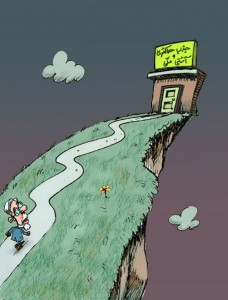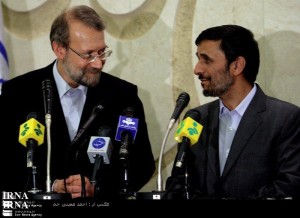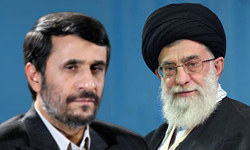The Latest from Iran (26 August): Ahmadinejad v. "Seditionists"
 Thursday, August 26, 2010 at 18:54
Thursday, August 26, 2010 at 18:54  2115 GMT: Economic Number of the Day. Deutsche Welle reports that the Ahmadinejad Government is now more than $140 billion in debt.
2115 GMT: Economic Number of the Day. Deutsche Welle reports that the Ahmadinejad Government is now more than $140 billion in debt.2010 GMT: Family Protection. Back to our first item of the day....
The Los Angeles Times offers an overview of the Family Protection Bill currently being considered by the Parliament, with Iranians offering a range of views on its provisions. The legislation has prompted criticism because of its provisions on the registration of temporary marriage (rejected yesterday by the Majlis) and on relaxing the conditions on polygamy.
2005 GMT: Political Prisoner Watch. Safe World for Women has published a special on human rights activists Shiva Nazar Ahari, detained since July 2009 and facing a possible death sentence on the charge of "moharab" (war against God).
Kurdish journalist Ejlal Qavami has been freed from interrogation.
1845 GMT: Parliament v. Government. MP Elyas Naderan, a leading critic of the Government, is at it again: he claims there is no serious will to implement subsidy cuts and says the Government is offering no information on implementation.
Members of Parliament for Zanjan have protested the dismissal of the head of Zanjan University, Professor Yousef Sobouti (see 0625 GMT).
Iran Propaganda Special: US Soldiers, Bitter Chocolate, & the Prophet Muhammad
Iran: Is President’s Chief of Staff Rahim-Mashai Taking On Foreign Policy?
The Latest from Iran (25 August): Unity?
1840 GMT: A Basij Empire? According to Peyke Iran, the head of the Basij paramilitary, Mohammad Reza Naqdi, has offered a vision of 7000 new Basiji bases: "Today we have 3.5 million active Basij; we must raise it to 20 million."
1830 GMT: Ahmadinejad Tough Talk. Rooz Online, drawing from Iranian sources, claims that the President has been dishing out critical comments in meetings: he called former President Hashemi Rafsanjani and former Presidential candidate Nategh Nouri "mofsed" (rotten people) and said that "seditionists" have not been dealt with yet.
1815 GMT: The President's Man Turns? Mehdi Kalhor, a former advisor to Mahmoud Ahmadinejad, has harshly criticised the President in a lengthy interview with Khabar Online.
Kalhor talked about Ahmadinejad's "wrong urban planning", including "forced migration" from Tehran, mis-management of the Mehr Housing Project, with the wasting of money by the Revolutionary Guard, and subsidy cuts.
Kalhor brought up the post-election conflict: "We have to find a sensible solution for many of last year's problems; there is still fire under the ashes." And he added this provocative comment about the President's loyalties: "I was insulted many times instead of [Chief of Staff Esfandiar Rahim] Mashai."
1800 GMT: Is This Iran's Nuclear Strategy? Some thoughts on the latest statement from Iran's head of atomic energy, Ali Akbar Salehi, proposing a joint consortium with Russia for production of fuel for the Bushehr nuclear plant (see 0835 GMT):
With the possibility of talks with the "5+1" (US, UK, France, Germany, Russia, China) this autumn, it appears Iran is playing down its need to enrich uranium to 20%, stressing instead the cooperation with Russia on low-level nuclear enrichment for power stations as well as finding domestic sources of uranium for an expanding system of nuclear energy production.
The presentation is that Iran is a responsible, low-enriching state, working under the supervision of the International Atomic Energy Agency and with the help of Russia. In essence, it is a proposal to the Western powers of what a nuclear Iran would look like if sanctions were eased and/or concessions were made.
Salehi's statement is therefore much more than a proposed arrangement for Bushehr and other plants. It is a challenge to Russia to endorse this vision of Iran's nuclear future, giving Moscow the opportunity to serve as a broker between Iran and the West.
1555 GMT: Sanctions Watch. Turkey's Industry and Trade Minister Nihat Ergun has said that joint projects with Iran will continue despite United Nations and United States sanctions on Tehran.
1545 GMT: Political Prisoner Watch. Radio Zamaneh has more on the reformist Islamic Iran Participation Front's statement of concern about the return to detention of senior member Mostafa Tajzadeh and journalist/filmmaker Mohammad Nourizad.
The IIPF calls describes the blackout of information since Tajzadeh and Nourizad were summoned back to prison 11 and 8 days ago, respectively, as the “apex of lawlessness of the cruel-hearted jailors". The organisation condemned the violence against political prisoners and said that this will lead to the “fall of the Islamic Republic".
1500 GMT: Freedom Corner. Journalist and women's rights activist Mahboubeh Abbasgholizadeh and Mexican journalist Pedro Matías Arrazola have won Germany's Johann Philipp Palm Prize for freedom of expression and of the press.
1240 GMT: Missiles and Bombs. Edward Yeranian of Voice of America has a look at Iran's military posing, including yesterday's firing of a new version of a medium-range missile. EA makes an appearance by being just a bit cynical about the Tehran show of big muscles:
It is the other side of the threat narrative, that just as you get these whipped up stories in the United States about 'there could well be an Israeli attack on Iran,' that this is how Iran strikes back. If you are going to promote the fact that Tehran might be attacked, (Iran) will promote the fact that (it) can defend (itself).
And we also make the inconvenient --- well, inconvenient for some in the Government --- linkage to internal matters: "Facing all types of political pressure within the system, and we are not just talking about pressure from the (opposition) Green Movement or reformists, but pressure from other conservatives and from clerics within the system, that you want to present this image of authority, this image of control."
And for some more threat chatter, over to Reuters:
Iran has stockpiled enough low-enriched uranium for 1-2 nuclear arms but it would not make sense for it to cross the bomb-making threshold with only this amount, a former top U.N. nuclear official was quoted as saying.
In unusual public remarks about Iran's disputed nuclear programme Olli Heinonen, the former chief of U.N. nuclear inspections worldwide, told Le Monde newspaper that Iran's uranium reserve still represented a "threat."
0900 GMT: Political Prisoner Watch. Britain's leading publication on universities, Times Higher Education, picks up the story --- reported in EA on 19 August --- that Durham University has gone public with its concern over the health and situation of detained Ph.D. student Ehsan Abdoh-Tabrizi, writing an open letter to the Iranian Ambassador to Britain.
The university, in consultation with Abdoh-Tabrizi, had pursued the case quietly since the student was detained during a visit to Iran last December. However, it had grown frustrated with a lack of response from Iranian officials to its correspondence.
0855 GMT: One Way Around the Sanctions? Press TV reports that creditors of Daewoo Electronics, South Korea's third-largest electronics firm, have reached a deal to sell the company to Iranian home appliance maker Entekhab Industrial Group.
South Korea recently joined international sanctions against Tehran.
0850 GMT: The Election "Coup"? Green Correspondents carries a lengthy statement by reformist politician Ali Shakouri-Rad about the complaint brought by seven of his colleagues --- all in detention --- over alleged military interference before and after the 2009 Presidential election. Shakouri-Rad reviews the audio of the Revolutionary Guard commander outlining the military's tactics to suppress oppression.
0845 GMT: Fashion Watch. HRANA claims that Tehran Prosecutor General Abbas Jafari Doulatabadi has said that "bad hijab" is a crime.
0835 GMT: A Nuclear Solution? Ali Akbar Salehi, the head of Iran's Atomic Energy Organization, has said that Tehran has made a proposal to Russia for joint production of nuclear fuel for the Russian-built Bushehr plant: "We have made a proposal to Russia for the creation of a consortium, licensed by that country, to do part of the work in Russia and part of it in Iran. Moscow is studying this offer."
0830 GMT: MediaWatch. William Yong and Robert Worth of The New York Times pick up on the formal order from the Ministry of Culture and Islamic Guidance barring media from mentioning Mir Hossein Mousavi, Mehdi Karroubi, and Mehdi Karroubi by name.
Iraj Jamshidi, the editor of the recently banned newspaper Asia, tells them, “They [the Iranian Government] have already made it clear indirectly that news about these figures is banned,” said Under the current climate, no one dares to interview Mr. Moussavi or Mr. Karroubi. They want them to be forgotten.”
Interestingly, Yong and Worth tuck away in the story the news --- which may be far more politically important --- that Presidential aide and former Tehran Prosecutor General Saeed Mortazavi is one of the three officials suspended for connections to the Kahrizak Prison abuses.
0818 GMT: Tough Talk Today (Sedition and World War II Edition). Press TV, quoting Fars News, gets to the press conference of Minister of Intelligence Heydar Moslehi that we noted yesterday.
The "highlight" is Moslehi's assurance from his imagination, backing up the magic figure put out by Ayatollah Ahmad Jannati, the head of the Guardian Council, of a US-Saudi backing of opposition figures for "regime change": "This issue is true. A fund of over even one billion dollars can be imagined.
Moslehi then gave his proof: "We have found clear clues about foreign support for the leaders of sedition. [Iranian state media have been ordered not to refer to Mir Housavi Mousavi, Mehdi Karroubi, and Mohammad Khatami by name: thus "leaders of sedition.] For example, a man who collected news for the leaders of sedition was arrested and confessed to receiving aid from the CIA intelligence services." Another person who has fled the country used to write statements for the sedition leaders, he continued: "The individual has acknowledged receiving support from intelligence services."
But, Moslehi assured, there was really nothing to worry about: wise and timely measures adopted by Iran's security forces had thwarted all the plots.
Press TV also features an attempt by Iranian officials, reaching back to World War II, to get some of that $1 billion from its foes: "Vice-President for Parliamentary Affairs Mohammad-Reza Mir-Tajeddini said Wednesday that Iran sought to demand compensation since it sustained heavy damages despite its neutrality in the war....'More than 4,000 documents have been prepared and we are compiling more on the issue,' he went on to say".
0635 GMT: Cartoon of Day. Nikahang Kowsar, in Rooz Online, portrays --- with the help of the image of Mir Hossein Mousavi --- the Iranian regime's model of national reconciliation.

0630 GMT: Political Prisoner Watch. Kurdish author and civil rights activist Behzad Kurdestani has been detained. The reason for arrest is unknown.
0625 GMT: Academic Purge. Deutsche Welle offers an overview of Government pressure on academic officials, claiming more than 20 university presidents have been dismissed in recent months in a "purification" of academia.
Mehdi Karroubi has protested the dismissal of Professor Yousef Sobouti, the President of Zanjan University. Sobouti's removal brought vocal protests by Zanjan students earlier this week.
0615 GMT: Story of the Day: Revolutionary Guard and Ministry of Intelligence Fight It Out....
Rah-e-Sabz claims that the Islamic Revolution Guard Corps had installed monitoring systems in a seven-story building frequented by high-ranking politicians.
Last week some of the politicians detected the surveillance and, unaware of who carried it out, asked the Ministry of Intelligence to check the building. The Ministry denied responsibility and sent technical specialists, who inevitably discovered many IRGC cameras and microphones. As the specialists were leaving, they were accosted by a group of Revolutionary Guard. A fight followed, with guns even being drawn.
Rah-e-Sabz claims that the order for surveillance was given by Hossein Taeb, the chief of the IRGC's Intelligence Bureau. It adds that one of the missions was to gather information on Presidential Chief of Staff Esfandiar Rahim-Mashai, who has fallen out of favour with the Supreme Leader. The IRGC are allegedly sending reports directly to Ayatollah Khamenei.
0555 GMT: Political Prisoner Watch. Massoud Shafiee, the lawyer for three Americans --- Sarah Shourd, Joshua Fattal and Shane Bauer --- arrested in July 2009 when they walked across the Iraq-Iran border, has written Tehran Prosecutor General Abbas Jafari Doulatabadi to request review of the case, in part of Shourd's deteriorating health: “I told the authorities in charge of this case that this woman is sick and has an acute gynecological illness, asking them to at least allow her to be transferred to the the Swiss Embassy until her trial time, which of course they turned down."
Shafiee said, “The charge of espionage is unwarranted" against his clients; however, even "in the impossible event that my clients were guilty of the charge of espionage, the punishment for this charge is one year in prison".
The lawyer added that the three Americans have not had any interrogation sessions during the past six to seven months.
The mother of Sarah Shourd has asked concerned people to write Iranian authorities to press for the release of the detainees. President Adbullah Wade of Senegal, who is also chairman of the Organization of the Islamic Conference, added his voice to those calling for the freeing of the trio.
0545 GMT: Family Protection. Straight into the news this morning....
The Parliament has rejected one of the provisions of the Family Protection Bill, which has been heatedly opposed by women's rights groups and many other activists. Article 21 for legal registration of "temporary marriages" was rejected with only 45 of 290 MPs voted for it.
The vote on Article 23, which makes it easier for men to pursue polygamy by dismissing the current conditions for the first wife’s consent and for proof of financial means, is still ahead.
 Abbas Jafari Doulatabadi,
Abbas Jafari Doulatabadi,  Ali Akbar Salehi,
Ali Akbar Salehi,  Ali Shakouri-Rad,
Ali Shakouri-Rad,  Behzad Kurdestani,
Behzad Kurdestani,  Bushehr nuclear plant,
Bushehr nuclear plant,  Daewoo Electronics,
Daewoo Electronics,  Deutsche Welle,
Deutsche Welle,  Durham University,
Durham University,  Edward Yeranian,
Edward Yeranian,  Ehsan Abdoh-Tabrizi,
Ehsan Abdoh-Tabrizi,  Ejlal Qavami,
Ejlal Qavami,  Entekhab Industrial Group,
Entekhab Industrial Group,  Esfandiar Rahim-Mashai,
Esfandiar Rahim-Mashai,  Family Protection Bill,
Family Protection Bill,  Green Correspondents,
Green Correspondents,  HRANA,
HRANA,  Hashemi Rafsanjani,
Hashemi Rafsanjani,  Heydar Moslehi,
Heydar Moslehi,  Hijab,
Hijab,  Hossein Taeb,
Hossein Taeb,  Iran,
Iran,  Islamic Iran Participation Front,
Islamic Iran Participation Front,  Islamic Revolution Guard Corps,
Islamic Revolution Guard Corps,  Johann Philipp Palm Prize,
Johann Philipp Palm Prize,  Josh Bauer,
Josh Bauer,  Joshua Fattal,
Joshua Fattal,  Khabar Online,
Khabar Online,  Los Angeles Times,
Los Angeles Times,  Mahboubeh Abbasgholizadeh,
Mahboubeh Abbasgholizadeh,  Mahmoud Ahmadinejad,
Mahmoud Ahmadinejad,  Massoud Shafiee,
Massoud Shafiee,  Mehdi Kalhor,
Mehdi Kalhor,  Mehdi Karroubi,
Mehdi Karroubi,  Ministry of Culture and Islamic Guidance,
Ministry of Culture and Islamic Guidance,  Mir Hossein Mousavi,
Mir Hossein Mousavi,  Mohammad Khatami,
Mohammad Khatami,  Mohammad Nourizad,
Mohammad Nourizad,  Mohammad Reza Naqdi,
Mohammad Reza Naqdi,  Mohammad-Reza Mir-Tajeddini,
Mohammad-Reza Mir-Tajeddini,  Mostafa Tajzadeh,
Mostafa Tajzadeh,  Nategh Nouri,
Nategh Nouri,  New York Times,
New York Times,  Nikahang Kowsar,
Nikahang Kowsar,  Olli Heinonen,
Olli Heinonen,  Pedro Matías Arrazola,
Pedro Matías Arrazola,  Rah-e-Sabz,
Rah-e-Sabz,  Reuters,
Reuters,  Robert Worth,
Robert Worth,  Rooz Online,
Rooz Online,  Saeed Mortazavi,
Saeed Mortazavi,  Safe World for Women,
Safe World for Women,  Sarah Shourd,
Sarah Shourd,  Shiva Nazar Ahari,
Shiva Nazar Ahari,  South Korea,
South Korea,  Times Higher Education,
Times Higher Education,  Turkey,
Turkey,  Voice of America,
Voice of America,  William Yong,
William Yong,  World War II,
World War II,  Yousef Sobouti,
Yousef Sobouti,  uranium enrichment in
uranium enrichment in  Middle East & Iran
Middle East & Iran 


